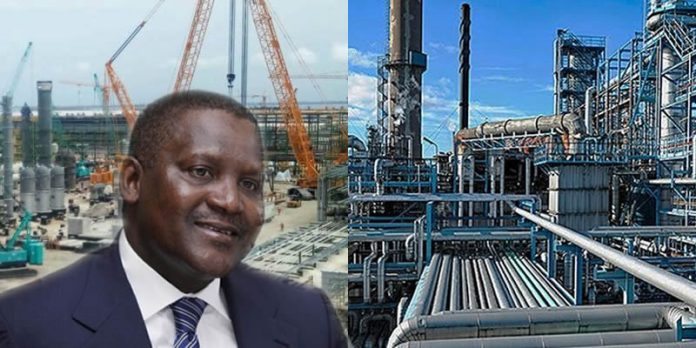Aliko Dangote, President of the Dangote Group, announced plans to increase his refinery’s storage capacity by 600 million litres, bringing the total to 5.3 billion litres. The Dangote Petrochemical Refinery currently holds 4.78 billion litres of refined petroleum products.
Dangote made this announcement during the Afreximbank Annual Meetings and AfriCaribbean Trade & Investment Forum in Nassau, The Bahamas. He accused international oil companies of refusing to sell crude oil to his refinery to hinder its success.
When asked about potential reductions in petrol prices, which currently stand at around N700 per litre, Dangote did not provide a clear answer. However, he cited an example with diesel prices, which fell from N1,700 to N1,200 shortly after his refinery began production. He explained, “The price dropped significantly, and with the current exchange rate, it’s still below N1,200.”
Dangote emphasized the refinery’s role as a strategic reserve for refined products, noting that Nigeria lacks strategic petrol reserves, which he finds dangerous. He highlighted the expansion of the refinery’s storage capacity as a move to safeguard the country’s petroleum product reserves.
Dangote also shared his struggles with securing crude oil, stating that international oil companies doubted his refinery’s potential. Despite this, he remains confident that his refinery is essential for Nigeria and sub-Saharan Africa, expecting temporary resistance from non-suppliers of crude and non-purchasers of products.
Importing crude oil from the United States, Dangote urged the Nigerian government to enforce regulations against the importation of dirty fuels, linking them to rising cancer cases in Nigeria and Africa. He advised Caribbean nations to monitor the quality of their imported fuels.
Despite Nigeria’s significant crude oil reserves, the country relies heavily on imported refined fuel. Dangote projected that Nigeria would stop importing fuel once his refinery starts selling premium motor spirit (PMS) in the coming weeks. He also plans to supply cheaper fuel to the Caribbean, citing high fuel prices in the region and expressing his intent to establish a terminal there to facilitate access to affordable energy.
Recounting past challenges, Dangote revealed that a former Saudi Arabian Energy Minister discouraged him from building the refinery, suggesting it was a task for major oil corporations or sovereign nations. However, Dangote persisted and overcame numerous obstacles, including attempts by both local and international cartels to sabotage the $19 billion Lagos-based refinery project.
During the COVID-19 pandemic, some international banks attempted to force Dangote into loan defaults to halt the project, but support from banks like Afreximbank helped him persevere. He has repaid $2.4 billion of the $5.5 billion loan for the refinery.
Dangote’s operations generate 1,500 megawatts of power, reducing pressure on the national grid. He suggested that power generation should be a separate business to lower costs for industries.
As the Dangote refinery and other indigenous producers commence large-scale production, operators predict a significant drop in petrol prices to about N300 per litre, similar to the impact on diesel prices. However, oil marketers caution that any reduction in petrol prices may be marginal.
In May 2024, Dangote asserted that Nigeria would no longer need to import petrol starting June, predicting the refinery would meet West Africa’s petrol and diesel demands. Although minor delays have pushed the release of premium motor spirit to mid-July, Dangote remains optimistic about the refinery’s transformative potential for Africa’s energy landscape.













